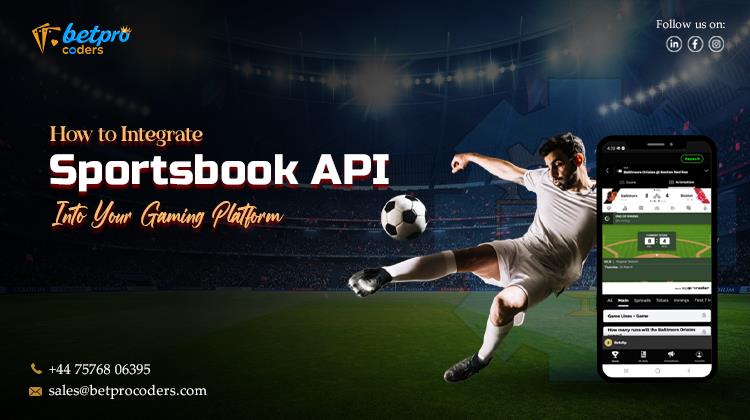It is extremely crucial in this fast-developing iGaming industry to stay ahead of the competitors with real-time sports data, smooth betting options, and an engaging user experience. That is where Sportbook API Integration should be involved. A Sportsbook API enables gaming platforms to access data directly for live odds, match stats, betting markets, and results of various sporting events globally. The integration of a robust API will save the development time of operators, provide accurate data, and offer users a highly engaging experience and a fully interactive betting environment. Regardless of whether you are deploying a new one or upgrading an existing betting platform, optimizing the Sportsbook API integration process can enhance functionality, scalability, and user experience.
Contents
- 1 What is a Sportsbook API
- 2 Why API Integration is Critical for Modern Sportsbooks and Gaming Platforms
- 3 Essential Preparations and Requirements Before API Integration
- 4 Step-by-Step Sportsbook API Integration Process
- 4.1 1. Choose the Right API Provider
- 4.2 2. Obtain API Access and Credentials
- 4.3 3. Set up a Development Environment
- 4.4 4. Integrate Core Data Endpoints
- 4.5 5. Implement Betting Logic and Features
- 4.6 6. Integrate Payment and User Management Systems
- 4.7 7. Test Thoroughly
- 4.8 8. Deploy to Live Environment
- 4.9 9. Monitor and Optimize
- 5 Essential Features of Sportsbook API Integration
- 6 Strategic Business Benefits of Sportsbook API Integration
- 7 Cost Analysis and Strategic Business Considerations
- 8 Common Challenges and Best Practices for Long-Term Success
- 9 Conclusion
- 10 FAQs
What is a Sportsbook API
The Sportsbook API is a software interface that connects a game or sport betting platform to the backend, providing seamless access to sports data, betting markets, and real-time odds. It acts as an interconnection between your platform and the data provider, allowing instant updates on live, in-play statistics and bet settlement information.
An operator can add various types of sports like football, cricket, basketball, tennis, and esports to their platform through the Sportsbook API, without developing everything from scratch. This will not just save development time, but also ensure accuracy, security, and scalability. Basically, it is the backbone of any modern sports betting webpage or application, providing the statistics and functionality necessary to deliver a seamless and enjoyable betting experience.
Why API Integration is Critical for Modern Sportsbooks and Gaming Platforms
In this modern era of the fast-paced iGaming market, offering real-time updates, a variety of betting markets, and well-functioning operations is only possible with efficient API integration. API Integration makes sportsbooks accurate, fast, and scalable for a competitive betting business experience.
Market Insight:
- The global Sports Data API market was valued at USD 4.78 billion in 2024 and is projected to reach USD 31.13 billion by 2032, growing at a CAGR of 26.4 %.
- Another estimate values the Sports Data API market at USD 1.67 billion in 2024, with growth to USD 4.42 billion by 2033 (CAGR ~11.5 %)
Here is why API Integration is Essential:
- Real-Time Data Access: View instant live odds, score information, and match details on the spot so that players can have the most up-to-date and accurate information about bets.
- Enhanced Market Coverage: Provide several betting sports, leagues, and tournaments, without the need to create everything from scratch.
- Scalability: Introduce new sports, betting markets, and features on the platform or expand without significant technical amendments or interruptions.
- Operational Efficiency: Streamline payments, user authentication systems, and risk management tools on a single platform to ensure that betting is faultless.
- Regulatory Compliance: Share data safely and adhere to local gambling regulations, reducing the risk of licensing or legal problems.
- Improved User Engagement: Provide users with smooth, trusted, and entertaining betting options to keep them engaged with your platform.
Read Also: Top 10 Sportsbook Software Providers In 2025
Essential Preparations and Requirements Before API Integration
Before plunging into Sportsbook API Integration, it is important to build a strong base so that the process runs smoothly and effectively:
- Defining Business and Technical Requirements: The most significant measure is to elucidate the business goals and the technical abilities required to achieve business objectives. This includes:
- Target Audience & Markets: Choose sports, leagues, and regions you would like to cover.
- Betting Features: Decide forms of betting to offer, such as pre-match betting, live betting, cash-out bets, and custom bets.
- Regulatory Compliance: Make sure the integration complies with the laws of your target jurisdictions.
- Technical Capacity: Check the capacity of your current infrastructure to deal with enormous data traffic, real-time updates, and spikes.
- API Documentation and Environment Setup
After you have chosen the API provider, the second step is obtaining access to their API documentation, including details of endpoints, authentication approaches, rate limits, and data format guidelines. This paper acts as your integration blueprint.
You will also need to create a development environment (Sandbox), which is provided by the API vendor. It enables your developers to test features, simulate betting scenarios, and solve problems without interrupting the live platform. Proper environment configuration ensures seamless transitions and prevents unexpected errors when you go live.
Step-by-Step Sportsbook API Integration Process
Integrating a Sportsbook API into your gaming platform requires a strategic structure to make it stable, accurate, and compliant. The following are the steps to help you navigate through it easily:
1. Choose the Right API Provider
Choose the API provider that operates a sportsbook with proven reliability, wide coverage of sporting events, speed in data delivery, and compliance with the intended jurisdiction.
2. Obtain API Access and Credentials
Your provider will give you authentication keys, endpoints, and access to their API documentation after signing a service agreement. These are the credentials required to link your platform to their systems.
3. Set up a Development Environment
Use the Sandbox and staging environment provided by the API vendor to test integrations. This will avoid interference with your live platform in the development process.
4. Integrate Core Data Endpoints
Integrate crucial endpoints regarding schedules, live-based scores, odds markets, and bet payoff. Make sure these endpoints are optimized for real-time updates.
5. Implement Betting Logic and Features
Add features like pre-match betting, live betting, cash-out option, and history of bets. Your betting logic must align with the business objectives and the regulatory requirements.
6. Integrate Payment and User Management Systems
Integrate secure payment gateways for deposits and withdrawals, and connect the API to your other systems of user authentication and account management.
7. Test Thoroughly
Run end-to-end testing, including placing bets, changing odds, processing payments, and settling bets. Ensure data accuracy, speed, and error correction are up to standard.
8. Deploy to Live Environment
After testing and compliance checks have been done and passed, transfer your integration from the development environment to the live platform.
9. Monitor and Optimize
Monitor API, players, and betting patterns after launch. Keep them optimized to achieve higher speeds, scaling, and usability.
Read Also: Explore the Process of Sportsbook Software Development
Essential Features of Sportsbook API Integration
In the selection and installation of a Sportsbook API Integration, the features of integration are critical in determining how engaging, effective, and scalable your betting platform can be. Below is the list of features that need to be provided to offer a competitive and user-friendly experience:
1. Real-time Odds & Market Feeds
Quick and proper odds are the most important thing in any sportsbook. The API should provide live updates of the market during the live play to give the players the best chance of betting without delays.
2. Comprehensive Sports Coverage
Your API sportsbook should be capable of supporting various sports, leagues, and events, such as football, cricket, basketball, tennis, and eSports, to ensure a constantly growing audience.
3. Live Match Data & Statistics
Live detailing of scores, player statistics, team performance, and play-by-play updates makes betting even more interactive and enables players to make informed decisions.
4. Best Management Functions
The API should enable a smooth analysis of placing bets, tracking, settling, and history management. This offers support for various bet options, including the single, multiple, and even system bets.
5. Regulatory and Compliance Tools
Compliance can’t be avoided in sports betting. The API must include geo-blocking tools, player verification (KYC), responsible gaming, and reporting to meet licensing requirements in various jurisdictions.
6. High Availability & Scalability
Betting traffic should be able to spike during major events, so you need your API to have high uptime and scale seamlessly to accommodate high loads without being impacted.
Read Also: Must-Have Features Of Sportsbook Software
Strategic Business Benefits of Sportsbook API Integration
Beyond the technical benefits, sports betting API integration offers immense business benefits affecting growth, profitability, and long-term maintainability.
1. Faster Time to Market
Through API solutions, operators can deploy a fully functional sportsbook much faster than developing it themselves, leaving no market gaps for competitors and achieving the advantage first.
2. Cost Efficiency
APIs abolish in-house implementation of sports data systems, thus lowering infrastructure and maintenance costs, while providing a source of high-quality, real-time information.
3. Enhanced User Engagement
Users spend more time on platforms with updated real-time odds, betting options, and different bets. The enjoyable process of betting will lead to retention, making your playground active even during low and high seasons.
4. Revenue Growth
A variety of sports, leagues, and betting markets attracts more users. This acceleration of betting activity and the wider audience leads directly to an increase in revenue, and hence the platform will be more profitable in the long term.
5. Scalable Business Model
Sportsbooks APIs are developed to handle growth. With an expanding user base, you can add more sports, events, and functionalities without changing your core system to accommodate them.
6. Regulatory Readiness
Most of the APIs have tools of compliance, which include player verification, geo-restriction, and responsible gambling features. This simplifies the process to meet legal requirements in other jurisdictions and maintain licensing approvals.
For Free Consultation
Contact Number: +447576806395
Email: [email protected]
Cost Analysis and Strategic Business Considerations
It is best to learn about the cost factors and strategic considerations that will shape your investment before moving to Sportsbook API Integration. The overall pricing will depend on API provider fees, complexity of integration, size, and platform maintenance needs.
- API Licensing Fees: Most providers are charged a fixed monthly fee or a revenue-sharing model, or both. Depending on the sports coverage and features, it charges between several hundred and thousands of dollars.
- Development & Integration Cost: Plan a budget for skillful developers to integrate the API, deploy the backend systems, and provide compatibility with your current platform. Higher-level operations, like live betting and multilingual, may be costly.
- Infrastructure & Hosting: Hosting solutions should be fast and scalable for high uptime. This may include cloud hosting, load balancing, and data security, which increases the operational cost.
- Compliance & Licensing: Developing in controlled markets includes licensing fees, compliance audits, and legal expenses. There are API providers who can help with compliance tools, though you will still have to invest resources in legal approvals.
- Ongoing Maintenance & Updates: After launch, a continuous supply of API updates, server monitoring, security patches, and bug fixes is required. These are recurrent costs that have to be paid to maintain performance with reliable service.
Estimated Cost Breakdown
| API Licensing Fees | $500 – $5,000 |
| Development & Integration | $5000 – $20,000 |
| Infrastructure & Hosting | $1,000 – $3,000 |
| Compliance & Licensing | $10,000 – $50,000 |
| Ongoing Maintenance & Updates | $1,000 – $5,000 |
Read Also: Sportsbook Software Development Cost
Common Challenges and Best Practices for Long-Term Success
Though sports betting API integrations provide valuable advantages, but also associated with certain difficulties. Understanding these challenges and adhering to effective practices can make operations smooth and allow the long-term success of the platform.
Common Challenges
- Data Latency Issue: Slow or sluggish data updating might endanger the user’s experience and betting results, particularly in live betting.
- Integration Complexity: Integrating various APIs may be technically demanding and time-consuming, and ensuring they work with existing systems may be a challenge.
- Regulatory Compliance: The gambling laws differ by region. It will be challenging to meet requirements when operating in various jurisdictions.
- Scalability Concerns: Major sporting events need load balancing and powerful infrastructure to control traffic spikes.
- Security Risks: If APIs aren’t adequately protected with encryption and authentication, they could be used as entry points for cyberattacks.
Best Practices for Long-Term Success
- Choose a Reliable Provider: Choose an API vendor with proven uptime, good customer support, and extensive sports coverage.
- Optimize for Speed: Keep data delivery fast by using caching, CDN services, and improved queries during peak traffic periods.
- Stay Updated on Compliance: Check gaming laws in your target markets regularly and update your site accordingly.
- Invest in Scalable Infrastructure: Implement cloud-hosting options that support high traffic increases without a crash.
- Prioritize Security: To prevent user data, implement secure API keys, SSL encryption, and consistent vulnerability tests.
Read Also: Sportsbook Software Development – An Exclusive Guide
Conclusion
Sportsbook APIs Integration has become a necessity rather than an option in offering real-time odds, a wide variety of betting markets, and a smooth user experience in this highly competitive online betting environment. Faster time-to-market, regulatory preparedness, and right integration can transform the gaming platform into a highly competitive business that may become a profitable entrepreneurship.
Partnering with an enterprise-type development company like BetPro Coders will provide quality, scalable, and compliant integration that fits the requirements of your platform. Planning and being high-tech will allow you to remain ahead not only of industry trends, but also to attract more players and maximize long-term ROI.
FAQs
Q1. What is a Sportsbook API and how does it work?
Answer: A Sportsbook API connects your gaming site with the back-end of a sportsbook, where you can stream live odds, sports information, and the betting functionality in real-time with an automated and secure exchange of information.
Q2. How long does it take to integrate a Sportsbook API into an existing gaming platform?
Answer: Integration schedules are driven by complexity but generally require 4-8 weeks of setup, testing, and compliance testing with deployment into the live environment.
Q3. What are the typical costs involved in Sportsbook API integration?
Answer: The expenses rely on provider rates, level of integration, infrastructure requirements, and compliance costs. Generally, it is between thousands and hundreds of dollars yearly.
Q4. Which sports and markets can I access with a Sportsbook API?
Answer: You can access world sports such as football, cricket, basketball, tennis, and eSports, along with pre-match, in-play, and special betting markets. The coverage varies with your preferred API provider.
Q5. How are live odds and data updated in real time?
Answer: APIs update odds and match information immediately for both pre-match and live betting markets by using secure connections to retrieve data from providers’ servers.
Q6. Is Sportsbook API integration secure?
Answer: Yes, through encryptions, secure API keys, and authentication standards, integration of the Sportsbook API will offer protection of data and secure betting transactions.
Q7. Do I need a gambling license to use a Sportsbook API?
Answer: Yes, it is required in most regulated markets to have a gambling license to operate legally, even though the API provider offers compliance tools.
Q8. Can I customize the front-end design after API integration?
Answer: Absolutely, APIs handle the backend, so you can fully customise to create your vision for the front-end design of the platform to match your brand and user experience.
Q9. How do I handle API downtime or provider outages?
Answer: Use backup data solutions, caching, and redundancy solutions to reduce interruptions during API outages and preserve user confidence.
Q10. What are the key challenges in Sportsbook API integration?
Answer: The typical problems involve system complexity of integration, latency of data, regulatory constraints, scalability factors, and security threats.
Q11. How do I start integrating a Sportsbook API into my platform?
Answer: Start with clarifying what your needs are, choose a trusty provider, create a Test and Development environment, and test before going live.
Q12. What are the common technical challenges in Sportsbook API integration?
Answer: They include dealing with massive amounts of data, compatibility considerations with current systems, rate-limiting, and API Threats against an attack.
Q13. How scalable are Sportsbook APIs for handling high traffic during major sports events?
Answer: A majority of the most popular APIs are made to scale dynamically; however, it is also vital to have your hosting and infrastructure capable of handling periods of high traffic.
Q14. What regulatory and compliance considerations come with Sportsbook API use?
Answer: Operators are required to integrate responsible gaming features, adhere to local licensing regulations, and use KYC and geo-restriction methods to verify players.
Q15. How important is ongoing maintenance and support after integration?
Answer: It’s crucial. Frequent bug fixes, upgrades, and monitoring guarantee that your platform is safe, quick, and complies with changing market standards.







Leave a comment